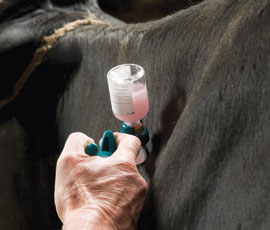Farmers urged to vaccinate for Schmallenberg soon

Livestock farmers considering treating their sheep and cattle with the newly released Schmallenberg vaccine are being advised to treat sooner rather than later.
Farmers are being urged to treat before the weather warms up to protect animals against increased midge activity and to ensure they treat when animals aren’t pregnant.
The long-awaited Bovilis SBV vaccine, which is manufactured by MSD Animal Health, went on sale at the beginning of this month and has already had widespread uptake from veterinary practices across the UK.
But under strict guidelines the vaccine cannot be administered to pregnant animals, which only leaves a small window of opportunity for some livestock producers.
MSD’s Ian Anderson says: “We can’t recommend use in pregnancy, as these studies haven’t yet been completed.”
Treatment of sheep
Instead sheep producers are being advised to vaccinate at least three to four weeks prior to tupping.
“The earlier you can do it the better. The weather is warming up, which increases midge activity and increases the risk of the disease spreading rapidly,” adds Mr Anderson.
Vet Ian Jones, from Hafren Veterinary Group in Newtown, Powys, says priority should be given to early-lambing ewes.
“We saw significant problems among sheep that lambed in January. If you’re lambing before the end of February vaccination is an absolute must,” he says.
Mr Jones says it is a financial consideration for commercial, later-lambing flocks, but urges pedigree breeders to vaccinate due to their higher value.
Treatment of cattle
Under strict guidelines, cows must be given two 2ml doses four weeks apart and farmers are being advised to then leave it another three weeks before breeding.
Because of this, many dairy and beef producers will be unable to vaccinate, because spring calvers will already have gone back to the bull by now, while autumn calvers will be heavily pregnant.
Mr Jones advises farmers to treat spring calvers if it fits in with their breeding programme. However, he admits many will be reluctant to delay breeding and risk disrupting calving patterns.
“If you’ve already gone to the bull don’t vaccinate, because we don’t know the risks,” he warns.
However, he says there is an opportunity to vaccinate autumn calvers post calving, providing they aren’t going back to the bull until December or January.
Mr Anderson says all male breeding animals should also be considered for treatment to safeguard fertility.
Natural immunity
Meanwhile, experts warn farmers shouldn’t be complacent if animals have already been infected.
“The majority of animals we blood tested have been positive, but we’ve no evidence to suggest it will confer a natural immunity,” explains Mr Jones.
He says there have been anecdotal reports of animals being re-infected.
“We have to assume the risk is still there,” he adds.
Mr Anderson says there is no guarantee flocks or herds that have already been infected with the virus will have developed 100% immunity.
While it seems sheep that have already been infected with SBV virus have built up strong natural immunity to the disease, Mr Anderson says it is difficult for farmers to establish exactly how many are immune and how many are still susceptible, due to varied levels of incidence on farms.
“Some flocks are 30% infected, so 70% are naive and could still go down with the disease this year.”
Instead, experts are advising farmers to play it safe and treat everything to be certain they have full cover.
NFU livestock board chairman Charles Sercombe lost 40% of lambs from his early lambing flock of 150 pedigree Charollais last December, costing between £15,000-20,000.
“We should have had 200 lambs, but we lost 80,” he explains.
He says vaccination is a “no brainer” for him and has already started vaccinating his pedigree ewes for SBV virus.
“They are very valuable and they will be one month pregnant in August and there’s more chance of increased midge activity then,” he explains.
However he says he won’t be vaccinating his later lambing commercial flock because of the sheer cost of vaccination.
Vaccine administration:
- Sheep should be given a single 2ml dose under the skin
- Sheep can be treated from four months and upwards
- Cattle should be given a 2ml intramuscular injection twice. The second must be administered four weeks after the first
- Cattle can be treated from two months and up
- The latest figures from DEFRA show 1,753 farms throughout Great Britain have been confirmed with SBV virus as of 31 March 2013
See a video of one sheep farmer’s story
